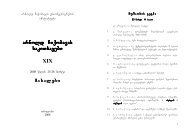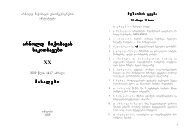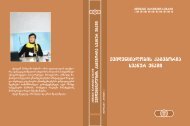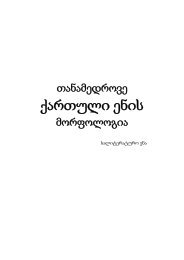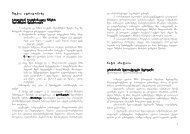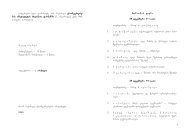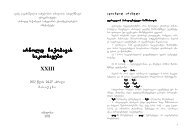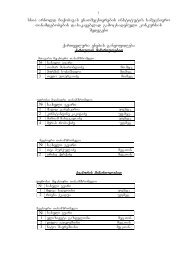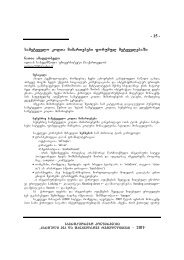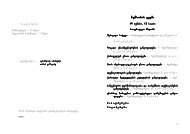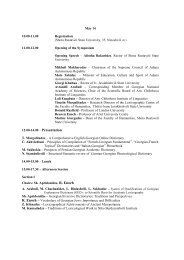5 r. a b a S i a (Tbilisi) bgeraTSesatyvisobis erTi rigisaTvis qarTvelur ...
5 r. a b a S i a (Tbilisi) bgeraTSesatyvisobis erTi rigisaTvis qarTvelur ...
5 r. a b a S i a (Tbilisi) bgeraTSesatyvisobis erTi rigisaTvis qarTvelur ...
You also want an ePaper? Increase the reach of your titles
YUMPU automatically turns print PDFs into web optimized ePapers that Google loves.
2. The peculiarities of addressing etiquette are as follows:<br />
a) The honorific forms are linguistically marked. The varieties of II personal<br />
pronouns are different according to the social status, rank, age, gender or<br />
caste (Geiger 1938; Disanayaka 1998; Apkhaidze 2005).<br />
b) Strangers do not usually use II personal honorific forms for addressing<br />
but marked words according to gender: nona “lady” and mahattayia<br />
“gentleman” which requires the dative construction of the subject. Therefore<br />
the question "what would you like?" in Sinhalese acquires the special shade as<br />
if it is meant the 3 rd number person; for example: mahattəyətə monəvədə<br />
ōnǃ? _ literally means: "What does the gentlemen want?”<br />
For the addressing of Buddhist monk the special II personal noun<br />
obəvəhansē < obə+ vahan + sē honorific you + sandals, shoes + manner<br />
(Geiger: 1938) is used.<br />
c) The usage of proper nouns for addressing three main categories of relatives<br />
is prohibited, for example between wives and husbands, between parents<br />
and children and between siblings.<br />
d) The kinship terms denoting grandparents, uncles, aunts and siblings<br />
acquire the nuance of politeness by adding the proper nouns. For example:<br />
dinēa ayiya = “Dinesha elder brother”; pihita siya = “Pihita grandfather”,<br />
premila akka= “Premila elder sister”, etc.<br />
3) There are many varieties of honorific suffixes in literary Sinhala which<br />
can be added to the nouns, pronouns and verbs, as well.<br />
When the S is marked by special honorific suffix , an adequate honorific<br />
one is generally affixed to its predicate.This practice is more regularly followed<br />
in Classics than in modern writings(Gunasekera1891).<br />
The problem we discuss in our paper is noteworthy not only for Sinhala<br />
language but also, in our opinion, it is important to be studied in the Kartvelian<br />
languages as well. The separate ethnographic, genetic, socio-linguistic<br />
questions for Georgian are studied by Georgian researchers but not completely.<br />
Obviously , it is not only the linguistic problem but also it is the subject of<br />
linguistic study due to the linguistic marking of this fact. If we want to study<br />
interrelation of the socio-cultural and language behavior norms , then it is necessary<br />
to study the specifics of the particular languages from this viewpoint.<br />
The object of our study has become Sinhala as comparatively with Georgian it<br />
58



